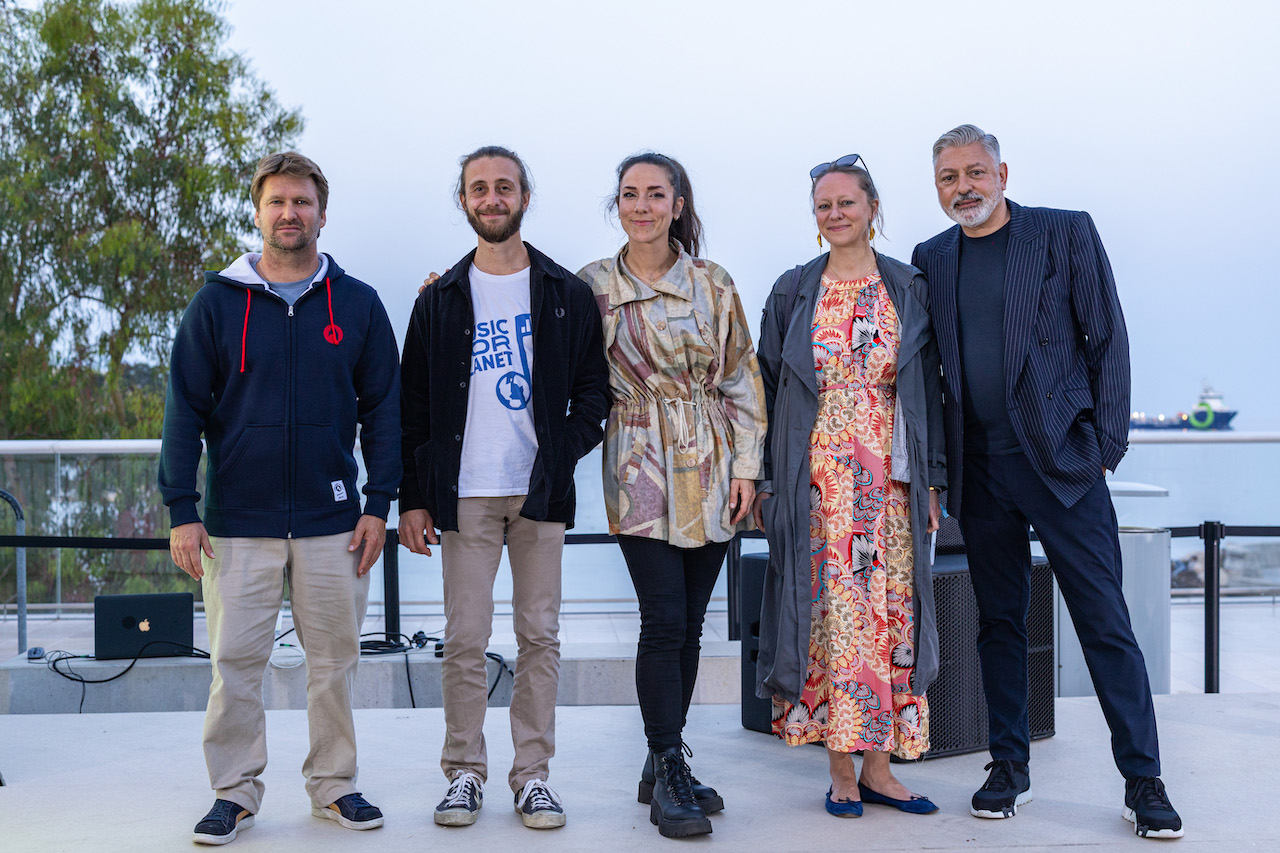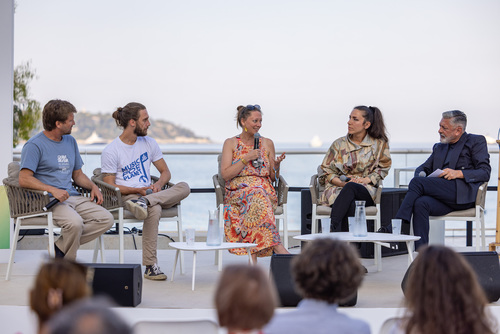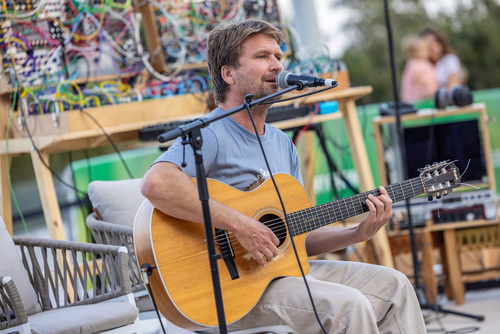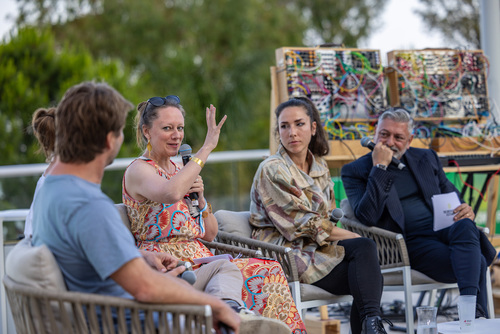
Ecology: Artists turn up the volume
The Green Shift Festival
Article by Charlotte Meyer published on 12 July 2025 as part of the media partnership between Les Échos and the Green Shift Festival (see the French article online).
Led by the Music for Planet association, a movement is emerging at the intersection of culture and the fight against climate change, with the aim of putting music at the service of transition.
"We don't want the music to stop." Once they start talking about it, it's impossible to stop them. The Music for Planet team is convinced that the fourth art has a major role to play in the fight against climate change. This conviction is the driving force behind their association, which was founded in Bordeaux in 2021.
"The initial idea was to create a kind of Enfoirés for climate and biodiversity, to bring together artists who would perform for these causes to benefit associations," explains Alexandre Jubien, co-founder of the organisation. Known for being one of the founders of Deezer, he had a successful career in digital technology before switching to ecology. "I grew up on an island," he says.
"I've always had this environmental awareness. As a child, I wanted to work with fish."
Another pillar of the association, Arthur Lecercle recounts his childhood in Nouméa and the devastation wrought by the mining industry on the territory. An engineer by training, he worked at Utopies, a pioneering sustainable development consulting firm, while continuing to make music: "Music has the power to weave new narratives about society, offering a positive and engaging vision of change. It allows for artistic expression around a joyful vision that makes us want to change our habits. Music for Planet is truly the intersection of my convictions and my passions. "
A different relationship with the world
Since its creation, the association has been mobilising artists capable of inspiring desirable narratives. The team seeks out and supports voices that embody a different relationship with the world. Among them is Tom Frager, French surfing vice-champion in 1993 and 1994, known for writing ‘Lady Melody’, the hit song of summer 2009.
"The ocean has given me everything. I had to give something back" explains the singer. Son of a renewable energy engineer, he spent much of his childhood in Africa, then in Guadeloupe, where he started surfing. Over time, his career as a professional surfer confronted him with the state of the ocean: "I saw it deteriorating. During my first junior world championships in Bali, the water was crystal clear. I saw plastic accumulating there year after year. " At around the age of 23, an ankle injury slowed down his career and pushed him into the arms of music, his second passion.
His commitment to the environment was evident from his first album, released in 2005. For example, he refers to the major oil spills caused by the sinking of the Prestige the previous year. "Patches of oil washed up on the beach here in the Landes. The birds were covered in it," he recalls. In his eyes, this commitment came naturally. "I felt legitimate in defending this cause. When you're behind a microphone, you can get messages across to a lot of people," he says, citing the examples of Bob Marley during the Jamaican civil war and the band Shaka Ponk, who recently announced that they were stopping touring for environmental reasons.
Transforming imaginaries
This sensitivity is reflected in the words of Hélène Vogelsinger, an experimental electronic composer: "In my family, awareness of living things runs in the blood. Thirty years ago, my mother was already recycling, and my grandfather took in all the animals in the neighbourhood – he was like Noah's Ark! " Born in Bordeaux into a military family, this songwriter has never had a fixed territorial anchor. As a teenager, she lived in Lebanon, then in south-western France. But it is in spaces abandoned by humans that she finds her true roots. This intimate connection with nature feeds her art. In recent years, the composer has become known for her music played on a modular synthesiser in abandoned places that are in the process of being reclaimed by nature. She can be found playing by an artificial lake above a submerged village or in the ruins of an abandoned double-decker bus in the middle of the forest.
"It's a fusion with the elements. I compose for a place, a mountain, a ruin,‘ explains the woman who sees music as a ’state of grace‘ in the face of an overdose of anxiety-inducing information. "My message is to remind people of the beauty of the world, to create bubbles where we can breathe, where we can feel again." "Seeing bands use their stage to denounce the climate emergency showed me the potential of music to inspire action. They have real power to influence," confirms Tom Mauguen, project manager at Music for Planet, referring to bands such as Massive Attack and Radiohead. But changing people's mindsets takes time. "There is no great contemporary musical work on ecology that has become a mainstream hit," observes Alexandre Jubien. While songs like Jean Ferrat's ‘La Montagne’ (1965) and Midnight Oil's "Beds Are Burning" by Midnight Oil (1987) may have been hugely successful in their day, the former Deezer employee regrets that contemporary protest songs such as ‘2083’ by Grand Corps Malade (2023) or "Les Séquoias" by Pomme (2019) do not resonate more with the general public.
From art to action
"Music is an immensely emotional medium. I see it as a refuge. It can become a tool for cultural change," continues the co-founder of Music for Planet. While this art form can open up spaces for emotion and reflection, it can also become a lever for action. Far from being satisfied with his own compositions, Tom Frager will release a collective album on 26 September, entitled ‘Septième Continent’ (Seventh Continent), in reference to the continent of plastic. Introduced by Paul Watson, the project brings together artists such as Zaho, Hugues Aufray and Ben Mazué with socially conscious lyrics on the theme of the ocean. Part of the profits from this album will be donated to Mouvement Bleu, the association created by Tom Frager this year. "The aim is to set up awareness-raising initiatives, such as beach clean-ups," he explains.
In his daily life, the former surfer limits his air travel as much as possible. A few weeks after the close of the third United Nations Conference on the Ocean in Nice, he confessed his disappointment at the inaction of institutions: "I am in favour of an ecology that does not make people feel guilty. The younger generations are increasingly educated about ecological issues. Awareness is growing, but major changes will come from decisions made by governments."
Hélène Vogelsinger takes this requirement to the extreme in her lifestyle. A vegan, she no longer flies and refuses to go on traditional tours: "We play four or five concerts a year, in selected venues, with as little travel as possible. We all live nearby. It's an ecological way of life."
Even her stage outfits are recycled pieces steeped in history. Perched with her instrument atop the Bouzloudja monument in Bulgaria, she wears her grandmother's dress. Today, she dreams of even more socially conscious projects, particularly involving animal shelters and sanctuaries. "If we want to protect nature, we must first reconcile ourselves with other humans. We cannot claim to love animals if we reject our fellow humans."
An industry in search of a model
While some artists are taking up the fight, the music world is still struggling to transform itself. ’It's an industry in the literal sense,‘ Alexandre Jubien reminds us. ’It smokes, it pollutes, it consumes." In addition to mobilising artists as sources of inspiration, Music for Planet has decided to support professionals in their environmental transition. Through interventions at festivals, a newsletter, a white paper and participatory workshops, the association is trying to raise awareness at all levels. The creation of a Music Fresco, inspired by the Climate Fresco, is underway in partnership with the Music Declares Emergency France collective and musicians from the Radio France Philharmonic Orchestra. The association has also launched a series of podcasts.
She was able to gather testimonials from an eco-friendly luthier, as well as artists such as Aldebert, who explains how to rethink tours in light of the environmental crisis, and scientists. On the programme, researcher François Gemenne talks about his love for the Beatles, and climatologist Valérie Masson-Delmotte recounts her youth as an accordionist. ‘It also helps to give a different image of scientists,’ explains Alexandre Jubien.
Reaching new audiences
But there is still a long way to go. The music industry remains dependent on economic logic that is not very compatible with sustainability. ‘A festival only becomes profitable when it is 95% full. How can we slow down under these conditions?’ asks Arthur Lecercle. Not to mention that the increase in extreme weather events can have an impact on the industry, leading, for example, to the cancellation of concerts and festivals. ‘We tend to forget that global warming is a direct threat to music itself,’ notes Alexandre Jubien. In the meantime, the association is increasing its partnerships with socially conscious artistic projects, such as the Terre du Son festival and hybrid initiatives like Savage Lands, an NGO founded by metal artists that funds reforestation projects.
‘A dynamic is emerging, with a good federation of actors,’ enthuses Arthur Lecercle, who applauds the ecological commitment of organisations such as the Bordeaux Opera House and the involvement of artists such as Fakir and Pomme. Recently, the team took part in the Green Shift Festival in Monaco with the aim of reaching new audiences. Despite its status as a public interest association, Music for Planet suffers from a lack of stable funding. ‘We live on subsidies, donations and a few performances. The balance is precarious,’ admits Arthur Lecercle. What do its founders want? For other initiatives such as Savage Lands to emerge in jazz, hip-hop and mainstream music. Like Tom Frager and Hélène Vogelsinger, they are all convinced that music can be a powerful force for change.
Illustrating this article : photos from the ‘Music and Ecology’ evening at the Green Shift Festival on 6 June 2025 (©Philippe Fitte/FPA2).




